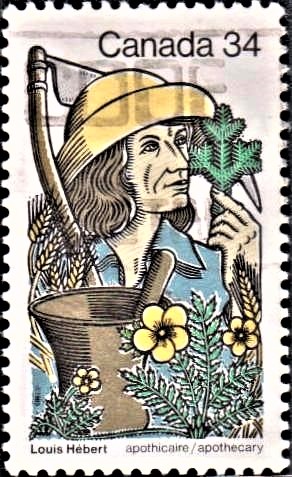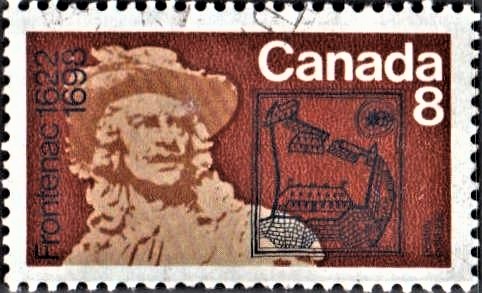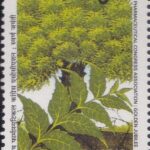
Louis Hébert
A commemorative postage stamp on the 45th International Pharmaceutical Federation Congress : Louis Hebert, first Canadian apothecary and first European to farm in Canada :
 Issued by Canada
Issued by Canada
Issued on Aug 30, 1985
About the Stamp Design : The stamp, by Montreal graphic designer Clermont Malenfant, illustrates Louis Hébert surrounded by objects relating to his life and work in the Quebec colony. The spring of balsam fir in his hand and the silverweed, both useful as herbal medicines, together with the mortar and pestle, symbolize his craft as an apothecary. With wheat and scythe, Hébert was able to provide the small colony with a store of food for the long winter months.
Type : Stamp, Postal Used
Colour : Multi Colour
Denomination : 34 Cents
Name : Louis Hébert
Born on 1575 at Paris, France
Died on Jan 25, 1627 at Quebec, Canada
About :
- Apothecary and Colonist :
- Louis Hébert was a prominent figure in the European settlement of Canada. He was the first French apothecary in the New World, the first magistrate of Quebec, and one of the first colonists of New France.
- Hébert is commemorated on a stamp issued to mark the 45th International Congress of Pharmaceutical Sciences of the International Pharmaceutical Federation, to be held from 2 to 6 September 1985 in Montreal. Canadian pharmacists consider Louis Hébert the father of their profession.
- False Start at Port Royal :
- The son of a court apothecary, Louis Hébert was born in a prosperous neighbourhood of Paris in 1575. Little is known of his early years. However, records show that he practised as an apothecary at Port Royal (Annapolis Royal, N.S.) from 1604 to 1607 and from 1610 to 1613. During the years in Port Royal, Hébert studied local flora, cared for the ill, and did some farming. In 1613, the colony was captured by the British and Hébert had to return to France.
- Success at Quebec :
- Hébert retained fond memories of North America. When Champlain, hoping to promote French settlement in the New World, suggested in 1617 that he settle in Quebec, Hébert eagerly accepted the opportunity and brought his family with him. The trading post was run at that time by the Compagnie des marchands, which, viewing agricultural colonization as a danger to the fur trade, accepted Hébert‘s arrival on condition that he devote only his free time to agriculture.
- Nevertheless, in the summer of 1618, Louis Hébert began to clear land and plant grain and vegetables. When winter came, he helped the sick and starving employees of the Compagnie to survive the winter through his talents as an apothecary and with food that he had harvested and stored. Champlain, who valued the skills of the courageous colonist, appointed him magistrate of the colony.
- Louis Hébert divided the last years of his life between legal and medical duties, but still found time to continue his agricultural work. He died in 1627, after an accidental fall.







